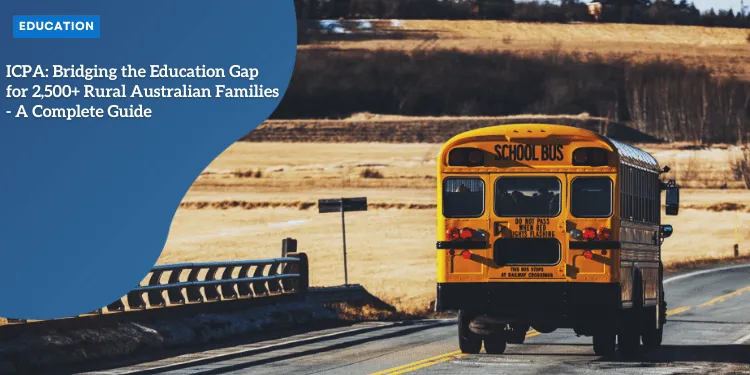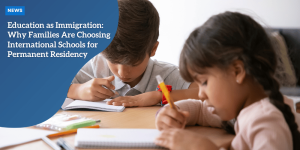ICPA: Bridging the Education Gap for 2,500+ Rural Australian Families – A Complete Guide

Anúncios
The Isolated Children’s Parents’ Association (ICPA) is a linchpin in Australian rural education, steadfastly supporting over 2,500 families across six states and territories.
Catering to a diverse membership that spans rural communities, primary producers, and small business owners, ICPA’s core mission is to ensure that students in remote areas have equitable access to quality education.
Role and Reach
ICPA functions on a broad spectrum, with branches working tirelessly to convey local concerns to state and federal councils.
These councils, in turn, collaborate with policymakers and educational institutions, striving to secure resources and beneficial policies for all ICPA members.
Anúncios
With its extensive reach and dedicated membership, ICPA adapts to the evolving educational landscape of rural Australia, advocating for improved support and resources to address the unique challenges faced by isolated families.
Diverse Membership
The ICPA’s membership is as varied as Australia’s landscape.
It includes members from rural communities, primary producers, and small business owners, all unified by the common goal of ensuring children in remote regions receive the same quality education as their urban counterparts.
This commitment is exemplified by Amanda Murphy, a publicity officer from the Northern Territory, who, like many others, joined ICPA to advocate for equitable educational access.
Core Mission
At its heart, ICPA’s mission is centered on providing equitable education for remote students.
Anúncios
This dedication is reflected in the variety of support models offered, from assisting families with children in boarding schools to guiding those maintaining second homes for educational purposes.
ICPA also provides invaluable resources for distance education and homeschooling arrangements, ensuring all children, no matter how remote, can achieve educational success.
Through these efforts, ICPA not only addresses the educational barriers faced by rural families but also strengthens community ties, fostering a supportive network that enhances the educational experience.
This holistic approach underscores ICPA’s ongoing commitment to bridging the education gap for rural Australian families.
Geographical Challenges in Remote Education
Impact of Vast Distances on Educational Access and Family Life
Living in remote Australia comes with the unique challenge of navigating vast distances to access basic educational facilities.
For many families, this means more than just a long commute; it represents a significant logistical endeavor.
The vastness of the Australian landscape often means that children might have to travel hundreds, if not thousands, of kilometers to attend school.
This journey, which can take up to a day or more, severely impacts family life and disrupts daily routines.
Challenges of Traveling Up to 1,000 Kilometers for School Attendance
Imagine a school run that involves traveling up to 1,000 kilometers. This is a stark reality for many rural families in Australia.
The sheer distance is not only physically exhausting but also financially draining due to the high costs of fuel, vehicle maintenance, and accommodation.
These long journeys take parents away from work and other responsibilities, causing a ripple effect that impacts the entire family structure.
Frequent travel can lead to fatigue, stress, and limited time available for family bonding and other essential activities.
Logistical Hurdles Faced by Families
Accessing educational facilities in remote areas requires more than just time and money; it involves overcoming significant logistical hurdles.
Many families must manage multiple layers of complexity, from coordinating long-distance travel to ensuring accommodation near schools.
Additionally, the availability of specialized educational services, such as assessments and interventions for learning difficulties, often requires further travel and coordination.
These logistical challenges add an extra layer of difficulty, making educational access not just an issue of distance but also one of resource allocation and careful planning.
Living and schooling in remote areas involves navigating these extensive geographical challenges, a reality that underscores the critical importance of support systems like ICPA.
Their role in advocating for resources and assistance is vital in helping these families manage the multifaceted demands of remote education.
The journey of handling these logistical and geographical obstacles sets the stage for understanding the financial implications and emotional impacts tied to remote education.
ICPA’s Educational Support Models
Support for Families with Children in Boarding Schools
For many rural families, the decision to send children to boarding schools comes with a significant emotional and logistical burden.
The geographical isolation often means early separation, as children move thousands of kilometers away.
Recognizing these challenges, the ICPA offers comprehensive support.
They provide practical advice and emotional backing, ensuring that both parents and children feel supported during this transition.
Assistance for Families Maintaining Second Homes for Educational Access
Some families choose to maintain a second home closer to educational facilities.
This setup allows children easier access to daily school but introduces financial and emotional challenges.
The ICPA steps in to advocate for financial aid and assist in adjusting to the dual-home lifestyle.
They ensure that parents stay connected with their children’s education despite the physical distance, fostering a feeling of continuity and support.
Guidance and Resources for Distance Education and Homeschooling
For many remote families, distance education and homeschooling are the most viable educational options.
Juggling work responsibilities while acting as educators can be overwhelming. The ICPA offers guidance and resources to ease this burden.
They facilitate connections with tutors, mentor families on utilizing technology, and provide best practices for home-schooling.
This support ensures that even the remotest children receive a quality education comparable to their urban counterparts.
As families navigate these educational models, it becomes essential to consider the financial implications associated with remote education.
| Program | Benefits |
|---|---|
| ICPA (Isolated Children’s Parents’ Association) | Supports 2,500 rural Australian families by offering grants, advocacy, and educational resources. |
| Scholarships & Grants | Provides financial support to families in remote areas to help with school-related costs. |
| Educational Resources | Offers access to resources that help bridge the education gap for isolated students. |
Financial Implications of Remote Education
High Costs Associated with Travel
For rural families, the financial implications of ensuring educational access are immense.
Traveling long distances to educational facilities is not just a logistical challenge; the costs associated with it are steep.
Fuel, vehicle maintenance, and accommodation expenses accumulate quickly.
For example, some families drive up to 1,000 kilometers to take their children to school, which translates into significant travel costs and vehicle wear.
Boarding School Fees and Distance Learning Resources
Boarding schools are a frequent necessity for remote families, but they come with considerable financial burdens.
Tuition fees, boarding costs, and additional expenses for school supplies can make this an overwhelming option.
Distance learning, while an alternative, isn’t free of costs either.
Purchasing technology, such as computers and internet access, and sometimes hiring in-home tutors adds another layer of financial strain.
Specialized Educational Support Costs
Moreover, families often require specialized educational support if their children have learning difficulties.
Accessing these services in remote areas necessitates additional travel, accommodation, and professional fees.
These costs can be substantial, leading to financial stress and impacting family budgets.
These financial aspects intertwine with logistical challenges, creating a complex scenario for rural families striving to provide quality education for their children.
As families navigate these hurdles, the consideration shifts towards the emotional and social impacts – a significant part of the experience.
Emotional and Social Considerations
Effects of Early Separation
For many rural families, sending children to boarding schools introduces early separation, which drastically impacts family dynamics.
Children as young as eleven often find themselves miles away from home, transforming familiar family routines overnight.
The absence of their children means parents can no longer share everyday moments or provide immediate comfort.
Challenges of Maintaining Family Connections
Maintaining strong family connections becomes another challenge as families are separated by vast distances.
Parents may need to travel up to 1,000 kilometers to attend school events or reunite for weekends.
This travel, demanding both substantial time and financial resources, often results in infrequent family gatherings, leading to feelings of isolation and disconnection for both children and parents.
Emotional Support Systems
The emotional strain of this separation is profound.
Children can feel homesick, lonely, and anxious, while parents worry about their child’s emotional well-being.
The lack of face-to-face interaction makes addressing issues even more challenging.
To alleviate these emotional burdens, ICPA fosters robust support networks that offer both parents and children the necessary emotional backing during these trying periods.
These measures help families navigate the emotional and social complexities of remote education, ensuring they are not alone in their journey.
ICPA’s Community Building Initiatives
ICPA’s role goes beyond providing educational resources; it is pivotal in strengthening community ties among rural families.
Let’s explore how ICPA builds a sense of belonging and fosters emotional connectivity.
Organization of Regular Meetings and Social Gatherings
Regular meetings and social gatherings are core to ICPA’s community-building efforts.
These events let parents, educators, and children share experiences, discuss challenges, and offer mutual support.
By facilitating face-to-face interactions, the ICPA helps families collectively address common issues related to remote education.
This sense of solidarity and network building is invaluable for families often spread over vast distances.
Coordination of Sports and Cultural Camps for Isolated Children
ICPA organizes sports and cultural camps, providing isolated children with opportunities to interact with peers.
These camps are critical for their social development. Activities range from traditional sports to various cultural practices, offering a diverse and enriching experience.
Such camps help children develop social skills and foster a well-rounded growth environment that they might not have access to in their isolated settings.
Development of Support Networks for Families Facing Similar Challenges
Beyond gatherings and camps, ICPA focuses on creating robust support networks.
These networks bring together families facing remote education challenges, whether through distance learning, boarding schools, or homeschooling.
By connecting these families, ICPA helps reduce feelings of isolation.
These support structures empower them to share resources, advice, and emotional support.
Through these community-building initiatives, ICPA ensures that rural families remain connected and supported, bridging the physical distance with emotional connectivity.
This reinforces communal ties and eases the complexities of navigating remote education challenges.
Advocacy and Future Direction
ICPA’s Role in Policy Development and Educational Reform
One of the core missions of the ICPA is to bridge the educational gap for rural and remote students by playing a proactive role in policy development and educational reform.
Members of the ICPA work tirelessly to bring pressing local issues to both state and federal councils.
By advocating for beneficial changes and necessary resources, the organization ensures that the unique needs of remote families are not overlooked.
This advocacy is crucial as policies formed in urban centers often fail to address the complexities of rural education.
Collaboration with Policymakers and Educational Institutions
ICPA’s strength lies in its collaboration with policymakers and educational institutions.
By creating a dialogue between rural families and those in power, ICPA ensures that policy decisions are inclusive and supportive of rural education.
Regular meetings with policymakers pave the way for equitable educational resources, allowing ICPA to voice the concerns and needs of their members effectively.
This collaboration helps secure essential funding, improve access to technology, and enhance educational programs tailored for remote communities.
Continuous Adaptation to Evolving Educational Needs
The landscape of education is continually evolving, and the ICPA remains adaptable to these changes.
By staying abreast of new educational practices and technologies, ICPA crafts and implements strategies that best serve rural families.
Whether it’s advocating for better internet infrastructure or seeking new-age educational tools, ICPA ensures that rural students are well-equipped to compete on an equal footing with their urban counterparts.
Through these concerted efforts, the ICPA remains a resilient advocate for rural education, constantly pushing for improvements and support systems that benefit families separated by vast landscapes.






